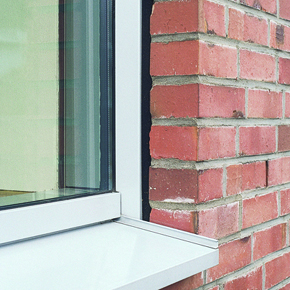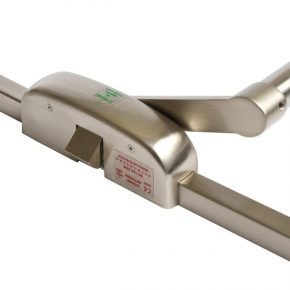
Wet or dry – what’s the solution to perimeter sealing?
Impregnated tapes are well specified and understood in the commercial window market and the many benefits, including thermal insulation of the joint, are becoming accepted in the domestic replacement sector.
Here, Steve Wild, business development manager for windows and façades at tremco illbruck, makes the case for a dry solution to perimeter sealing…
In the domestic replacement window market, the preferred choice of sealant for the perimeter sealing of windows has long since been established as silicone and, provided the appropriate type and quality is used, this can provide a durable seal which meets most expectations when correctly applied.
 What happens though, if a poor quality or wrong grade is chosen and perhaps coupled with an inferior application and an unsightly bead which draws attention to the edge of the window for the wrong reasons?
What happens though, if a poor quality or wrong grade is chosen and perhaps coupled with an inferior application and an unsightly bead which draws attention to the edge of the window for the wrong reasons?
Achieving a neat bead is often difficult, especially when the joint width varies and the construction reveal is irregular. Then there are the vagaries of the weather – sealants should not be applied to damp substrates or ones that may have experienced rainfall prior to curing.
Perhaps then, it is somewhat surprising that silicones (and occasionally other wet sealants) have proved to be so popular for such a long time given the above issues.
It is a fact that a very valid alternative has been available for around 20 years and one which has proven very popular in the commercial market – particularly when considering high performance windows, typically wood/ aluminium composites.
In this sector, those associated with the specification and use of associated materials have considered the high performance, durability and BBA certification provided by some impregnated tapes eminently suitable for providing a weather tight seal.
While, in the domestic market, it is a somewhat sad fact that very often, literally the only criteria considered when selecting the sealing product is price. It is well known that buyers and/or business owners will make such decisions based on saving a few pence on a cartridge. This policy is even more ill-founded when the windows themselves are increasing in quality and, therefore, deserve to be sealed more appropriately.
The domestic window market is always receptive to new ideas, despite what is often a deep-seated reluctance to change and an obsession with price.
Any analysis of the window energy-rating scheme will demonstrate that, if the concept is right, companies will invest in development and marketing in an effort to gain a competitive edge. There is every reason, therefore, to consider the benefits of alternative methods of sealing the windows in order to enhance the excellent properties of the window.
Impregnated tapes are well specified and understood in the commercial window market and the many benefits, including thermal insulation of the joint, are becoming accepted in the domestic replacement segment.
Any product’s market share will grow with increasing awareness and, as more suppliers promote such materials – and word of mouth endorsements follow – more installers are reacting positively. Social media is helping with this and B2B recommendations are increasing awareness.
Before the end of the year, the revised BS 8213-4 Code of practice for survey and installation of windows and external doorsets will be launched and recommendations for sealing windows and doors will include impregnated foam tapes in addition to conventional wet sealants.
This will inform installers of alternative methods of perimeter sealing and should provide comfort for building or fenestration inspectors that such products are recognised as being appropriate.
A typical installer has the choice to carry on regardless or consider a more innovative approach and promote the benefits of an alternative solution which, over a long period of time, has been proven to work and offer genuine enhancement to both installation practice and aesthetics.
Latest news

18th April 2024
Abloy UK showcases new digital portfolio at The Security Event 2024
Abloy UK is set to unveil its latest line-up of access control systems at The Security Event 2024, welcoming guests to explore its cutting-edge electromechanical and digital solutions on stand 5/F50.
Posted in Access Control & Door Entry Systems, Architectural Ironmongery, Articles, Building Industry Events, Building Industry News, Building Products & Structures, Building Services, Doors, Exhibitions and Conferences, Facility Management & Building Services, Health & Safety, Information Technology, Retrofit & Renovation, Security and Fire Protection
18th April 2024
Strand is a Failsafe Choice for Emergency Exit and Panic Hardware
In times of emergency, you’re in safe hands with Strand Hardware. Although there are many considerations for building specification, few decisions can be as critical as selecting the right emergency exit/panic hardware.
Posted in Access Control & Door Entry Systems, Architectural Ironmongery, Articles, Building Industry News, Building Products & Structures, Building Services, Doors, Facility Management & Building Services, Health & Safety, Restoration & Refurbishment, Retrofit & Renovation, Security and Fire Protection
18th April 2024
MRA appoints Callum Budd as Research Projects Director
MRA Research, the research agency focused solely on the construction sector, welcomes Callum Budd as its new Research Projects Director.
Posted in Articles, Building Industry News, Information Technology, news, Recruitment, Research & Materials Testing
16th April 2024
Mitsubishi Electric set to host CIBSE Journal webinar
Mitsubishi Electric will host a CIBSE Journal webinar on Wednesday 24th April 2024 at 1pm to discuss the legislation and initiatives driving changes in the way we will need to heat, cool and ventilate large commercial buildings to reach net zero emissions in the UK.
Posted in Air Conditioning, Articles, Building Industry Events, Building Industry News, Building Products & Structures, Building Regulations & Accreditations, Building Services, Facility Management & Building Services, Heating Systems, Controls and Management, Heating, Ventilation and Air Conditioning - HVAC, Information Technology, Pipes & Fittings, Plumbing, Seminars, Sustainability & Energy Efficiency, Training
 Sign up:
Sign up: